Introduction
Autism presents significant challenges for children in social interaction, communication, and behavior. Early intervention plays a crucial role in influencing their developmental trajectory and improving lifelong outcomes. This article explores effective treatment options, creating a supportive environment, building structure and routine, positive reinforcement techniques, managing challenging behaviors, coping with parental stress, practicing self-care, and advocating for your child.
By understanding these strategies and resources, parents can empower themselves to support the well-being and growth of their children with autism.
Understanding Autism and Early Intervention
Autism, a neurodevelopmental condition, presents significant challenges in social interaction, communication, and behavior. Acknowledging the crucial significance of early interference, it's vital to emphasize that prompt and suitable approaches can significantly impact the developmental path and enhance lifelong results for children diagnosed with autistic spectrum disorder. Based on the most recent research, advancements like randomized-controlled trials highlight the efficacy of particular interventions, thereby improving our comprehension and handling of the condition. Moreover, cutting-edge technologies such as AI are being utilized to forecast behavioral patterns in children with developmental disorders, which can enable timely and customized intervention strategies. The focus on infant and early childhood mental health is paramount, as this period lays the foundation for future emotional and social development. It is during these years that key attachments form, making it vital to address any mental health concerns without delay. As research continues to reveal the intricate interaction of genetic and environmental factors in the development of a specific condition, there is a pressing need for a 'needs-led' approach to assessment and assistance. This approach promotes early identification and prompt, effective assistance that is not dependent on a formal diagnosis. Such a strategy aims to mitigate the long-term impacts associated with a developmental disorder, such as mental health issues and educational challenges. Strengthening the legal basis for inclusivity and exchanging resources for personalized programming are components of a holistic strategy to assist individuals with developmental challenges and their families. Considering these factors, parents have an everlasting impact on nurturing the development and welfare of their offspring by staying informed and engaged with the most up-to-date scientific knowledge and available resources.
Effective Treatment Options
Engaging in the appropriate therapy is crucial for children with developmental disorders, as it can greatly impact their progress and integration into various aspects of life, including education, home life, and social interactions. Treatments like Applied Behavior Analysis (ABA), speech therapy, occupational therapy, and social skills training not only address various aspects of autism but also provide a customizable approach to meet the unique needs of every individual. ABA therapy, for instance, is designed to improve social, communication, and learning skills through positive reinforcement. Speech therapy can enhance communication abilities, while occupational therapy may focus on improving daily living skills and motor skills. Additionally, social skills training provides the tools to navigate and thrive in social interactions. These therapies, when effectively chosen and applied, contribute to a well-supported, equitable environment that promotes mental health and well-being for autistic individuals, as emphasized by research on the importance of equitable and engaged participation in society. However, it is important for parents to consult with healthcare professionals to assess these options and make sure the selected therapies are suitable for their offspring's unique requirements and potential.
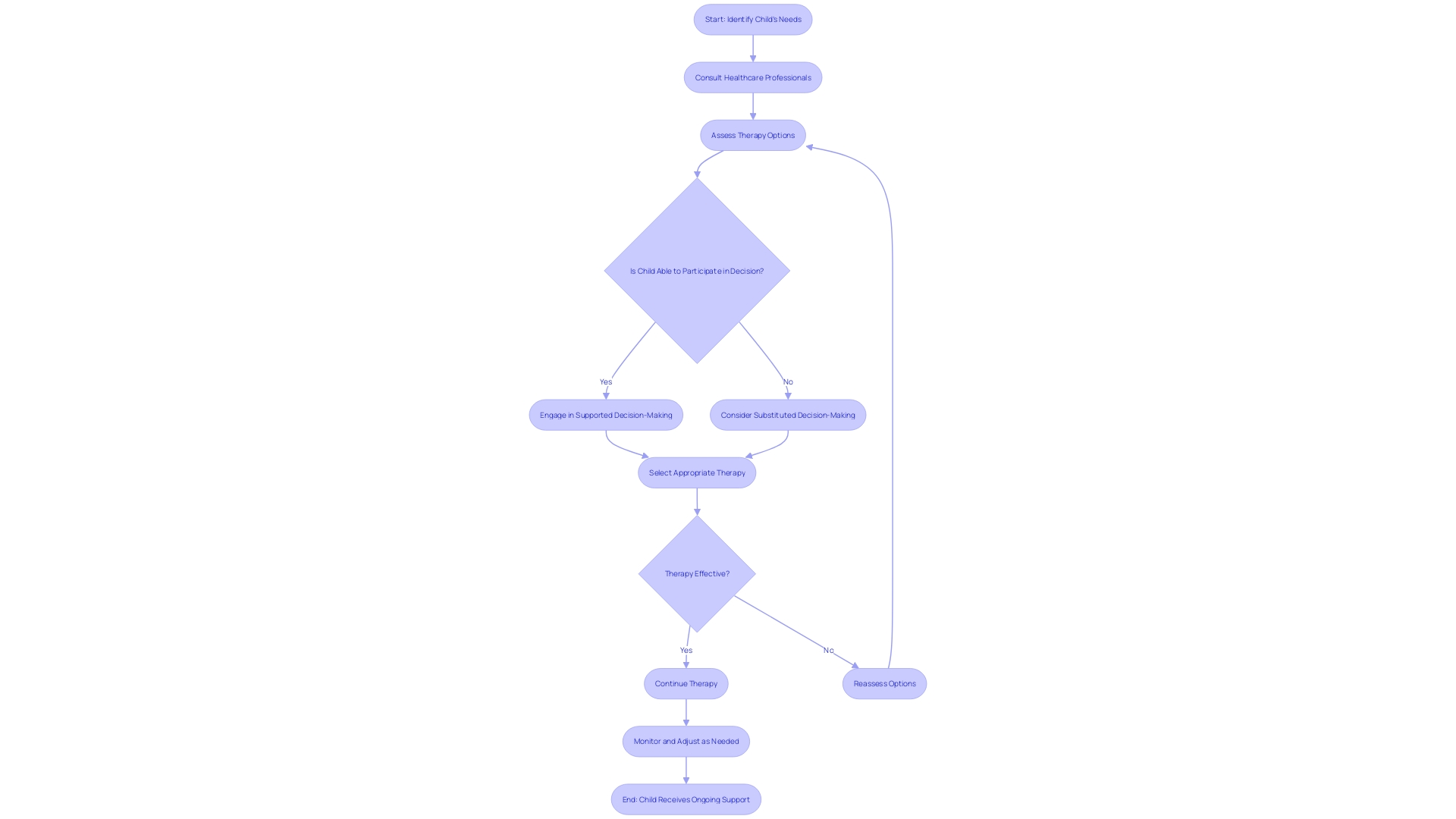
Creating a Supportive Environment
Creating a structured, predictable environment for individuals with developmental challenges not only helps them feel secure, but also minimizes anxiety and encourages positive behaviors. This includes implementing visual schedules and cues along with creating sensory-friendly spaces that cater to their unique needs. For example, the radiology department at Cork University Hospital in Ireland created an autism-friendly patient experience, which greatly diminished the time needed to finish imaging studies for children with autism. Such initiatives highlight the significance of comprehending and adjusting to the sensitivities of children with autism to improve their capacity to join and involve in different settings.
Emirates and Dubai International Airport have also recognized the benefits of a supportive environment by offering rehearsal flying experiences for neurodivergent passengers. This innovative program allows young individuals to become accustomed to the travel process, thereby reducing stress during actual flights. It's a fantastic example of how personalized experiences can greatly enhance the quality of life for individuals with autism and their loved ones.
Positive experiences during early years, which consist of secure and supportive relationships and surroundings, are essential for the well-being and growth of every individual. They contribute to the physical, social, behavioral, and intellectual development that is particularly crucial for individuals with autism. By ensuring that individuals with autism spectrum disorder have access to such positive experiences, caregivers can play a direct role in promoting equity and mental health, as emphasized by the late Dr. David (Dan) R. Offord, who advocated for a fair race for all individuals, including those with disabilities.
Building Structure and Routine
For individuals with autism, a structured environment is not just beneficial, it's a cornerstone of their ability to thrive. Sticking to a consistent routine each day minimizes stress and boosts their capacity to engage with the world around them. Parents play a pivotal role in crafting a visual schedule that breaks down daily activities and transitions into manageable segments. This isn't just a list; it's an anticipatory guide that empowers the young one to foresee and prepare for the day ahead, fostering a sense of security and readiness. Dr. David (Dan) R. Offord, a well-known psychiatrist specializing in children, highlighted the significance of establishing equal conditions for individuals with disabilities, expressing, 'I do not have a problem if my offspring are in a competition as long as the competition is just.' This sentiment underscores the necessity of providing individuals on the autism spectrum with the tools they need for success, such as a visual schedule, which acts as a fair starting block in their daily race. Furthermore, with appropriate assistance, individuals with autism can thrive not only in familiar locations but also in unfamiliar surroundings. For instance, Humza, an 11-year-old autistic individual, had a remarkable experience with Emirates airline. His familiarity with the airline's features, gained through meticulous research, allowed him to comfortably navigate his first flight. This mirrors the wider principle that when individuals on the autism spectrum are well-prepared and supported, they can confidently explore new territories and experiences.
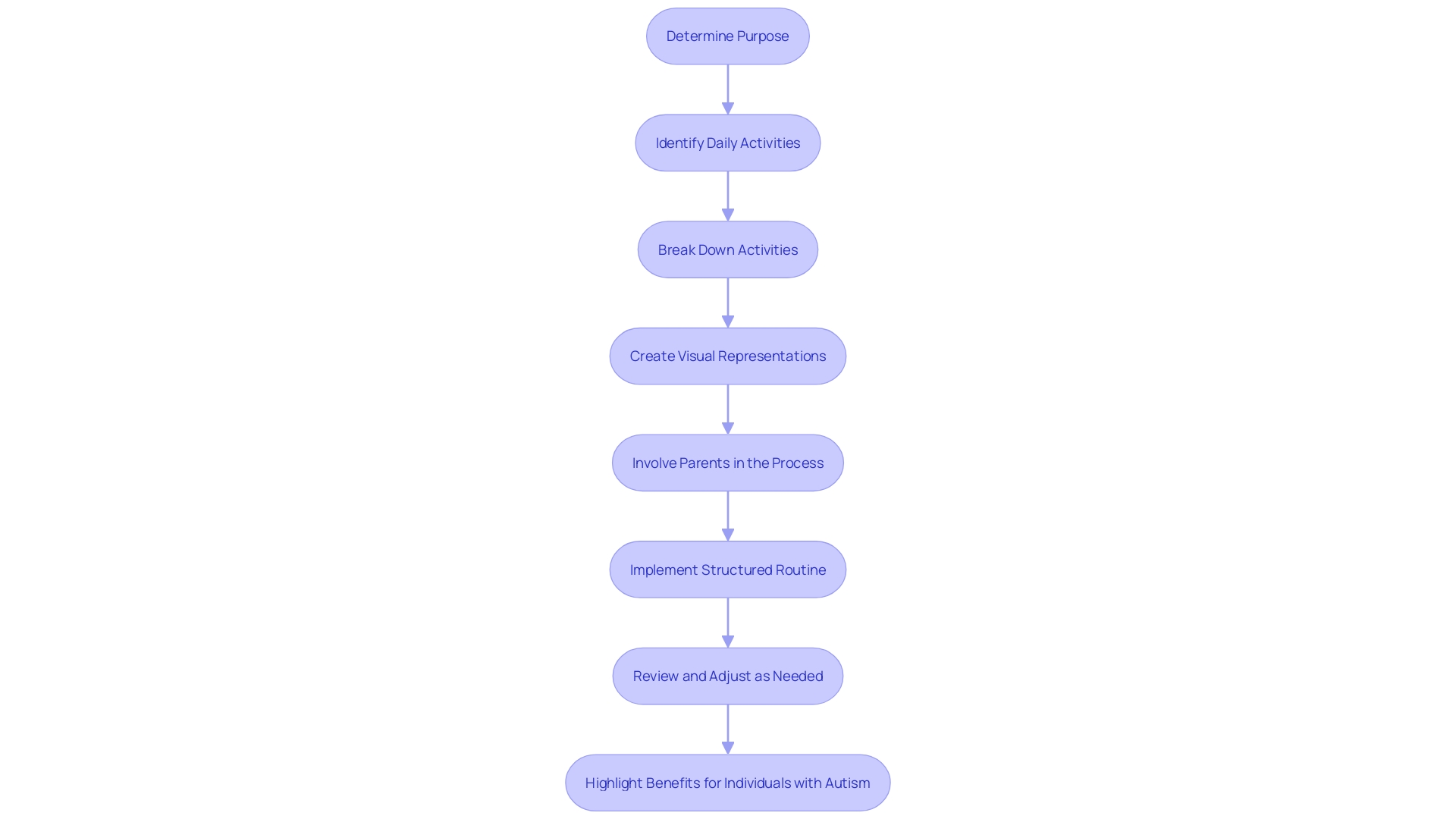
Positive Reinforcement Techniques
Implementing positive reinforcement techniques is a fundamental aspect of cultivating desirable conduct in individuals on the autism spectrum. The strategy is simple: when a young individual displays the desired conduct, they are given praise, benefits, or other stimuli that act as motivation. Such strategies are not only supported by the latest findings in scientific journals but also resonate with the principles of leading thinkers in the field. For instance, at the World Business Forum in November 2023, thought leader Chris Stanley emphasized the transformative power of positive reinforcement. This aligns with current research, which is increasingly leaning towards randomized controlled trials over quasi-experimental studies to accurately measure the impact of interventions like positive reinforcement on children with autism. These studies are essential for understanding the effectiveness of such interventions and ensuring that they lead to significant, long-lasting enhancements in conduct. Furthermore, the National Academies of Sciences, Engineering, and Medicine highlight the importance of these evidence-based practices and the need for social validation and careful outcome variable design. They stress the necessity for monitoring any adverse events and transparently communicating them, as well as managing conflicts of interest to maintain the integrity of the research. In practice, as mentioned in peer-reviewed literature, utilizing a continuous schedule of reinforcement can be especially effective during the initial stages of acquiring a new action, as it helps clarify the link between the action and its consequence. In the end, these strategies are intended to promote the welfare of children with ASD and contribute to an equitable and stimulating setting for their progress and advancement.
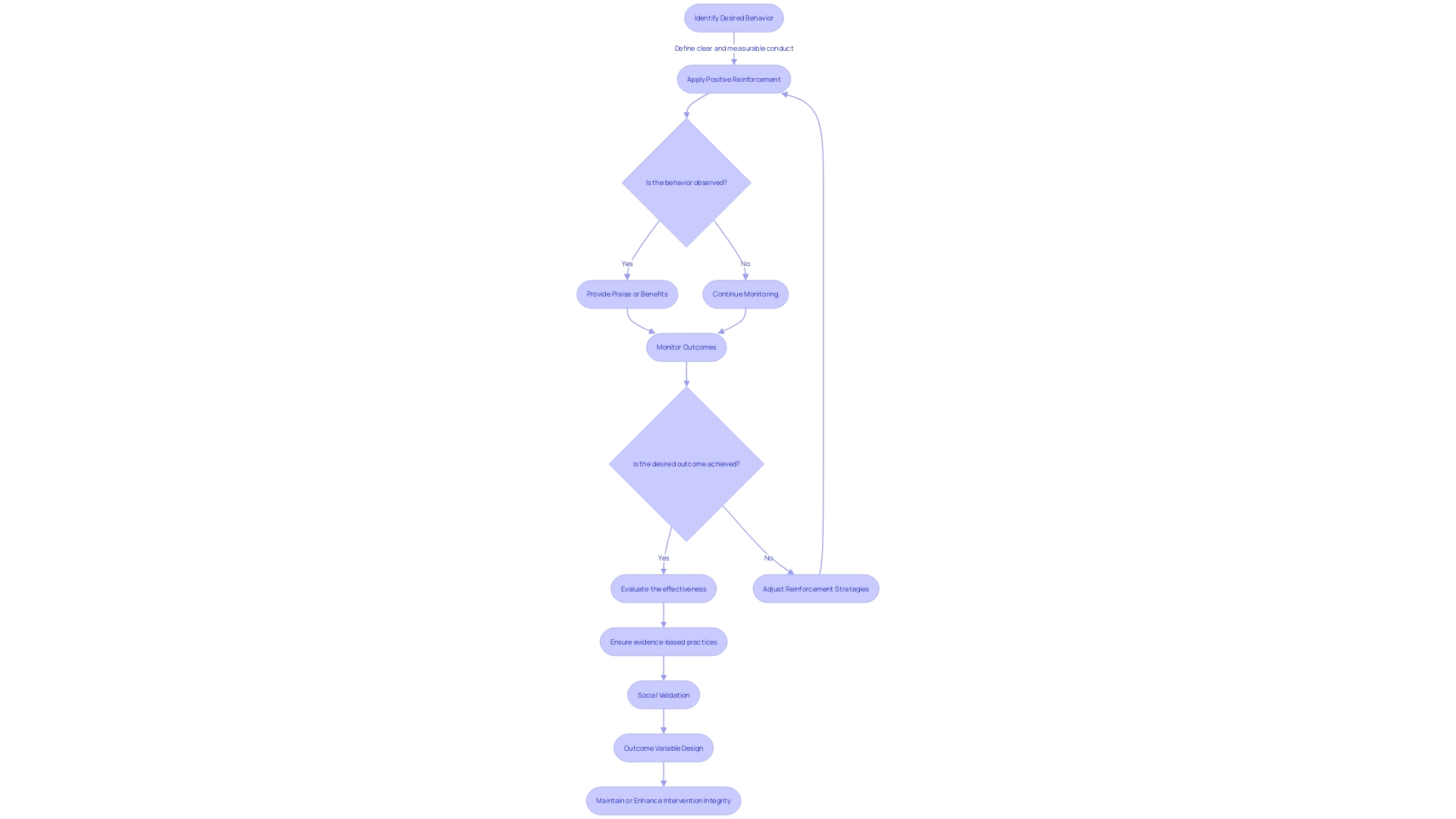
Managing Challenging Behaviors
Managing difficult behaviors in individuals with autism is crucial for their development and family dynamics. Effective strategies include the use of visual supports, social stories, and sensory integration techniques. These tools can help children process information and navigate their environment more comfortably. Additionally, identifying the factors that contribute to challenging behaviors, such as specific triggers or stressors, enables parents to develop proactive strategies that can prevent or minimize these behaviors.
Recent scholarly research underscores the significance of early intervention and tailored support. According to the National Academies of Sciences, Engineering, and Medicine, academic advancements in various fields are essential for the well-being of individuals and communities. This corresponds to the increasing understanding of the diverse spectrum of autism, as highlighted by Dr. Jan Blacher, indicating that interventions should be as varied as the individuals themselves.
Moreover, the development of emotional intelligence, including empathy and perspective-taking, is key in addressing behaviors effectively. These abilities enable for improved comprehension and interaction, which are essential in handling stress and emotional regulation in individuals with autism. This approach is supported by research which indicates that children with high emotional intelligence can navigate their feelings and relationships more effectively.
The Kevin and Avonte Program, named after two autistic teens who tragically lost their lives due to wandering, is an example of a targeted intervention to address severe actions. With over $10 million in grants since 2018, this program emphasizes the importance of community awareness, education, and emergency protocols. In a similar vein, state Medicaid plans offer customized approaches to address the complex needs of the community with unique challenges, with a significant impact due to the high number of individuals insured by Medicaid.
In summary, managing difficult behaviors in children with ASD necessitates a blend of personalized approaches, the cultivation of emotional intelligence, and programs supported by the community. Identifying the strengths of the young individual and offering the required assistance can result in more effective interventions and a more equitable competition for all children, as championed by the late Dr. David (Dan) R. Offord.
Coping with Parental Stress
Navigating the complexities of raising an individual with autism requires a multifaceted approach that includes personal well-being and community engagement. To mitigate stress, it’s essential for parents to engage in self-care practices such as physical exercise, mindfulness techniques, or indulging in personal hobbies that foster relaxation. The mental health of caregivers is essential, as their well-being directly influences the emotional environment of their offspring. Research highlights the significance of a harmonious and adequately-supported family life in promoting mental well-being for all individuals, especially those with disabilities.
Moreover, the exchange of experiences and insights with other parents who face similar journeys can prove to be an invaluable source of support. This communal learning is a potent tool for reducing feelings of isolation and for sharing strategies to navigate the everyday challenges. Recent literature indicates that only a small portion of anxiety in children can be linked to parenting, highlighting the significance of concentrating on approaches to assist children in managing anxiety rather than assigning fault.
In a society where the independence of young individuals has changed, and the pressure on parents is intensified by influences such as social media, it is crucial to uphold a well-rounded viewpoint and stay updated on the most recent developments in interventions and healing methods. The responsibility falls on caregivers to discern and evaluate the plethora of information available, seeking credible sources and expert advice to guide their decision-making process. By doing so, parents can better support their offspring's developmental journey, contributing positively to their overall well-being and fostering equity in the 'race' of growing up, as once envisioned by child psychiatrist Dr. David (Dan) R. Offord.
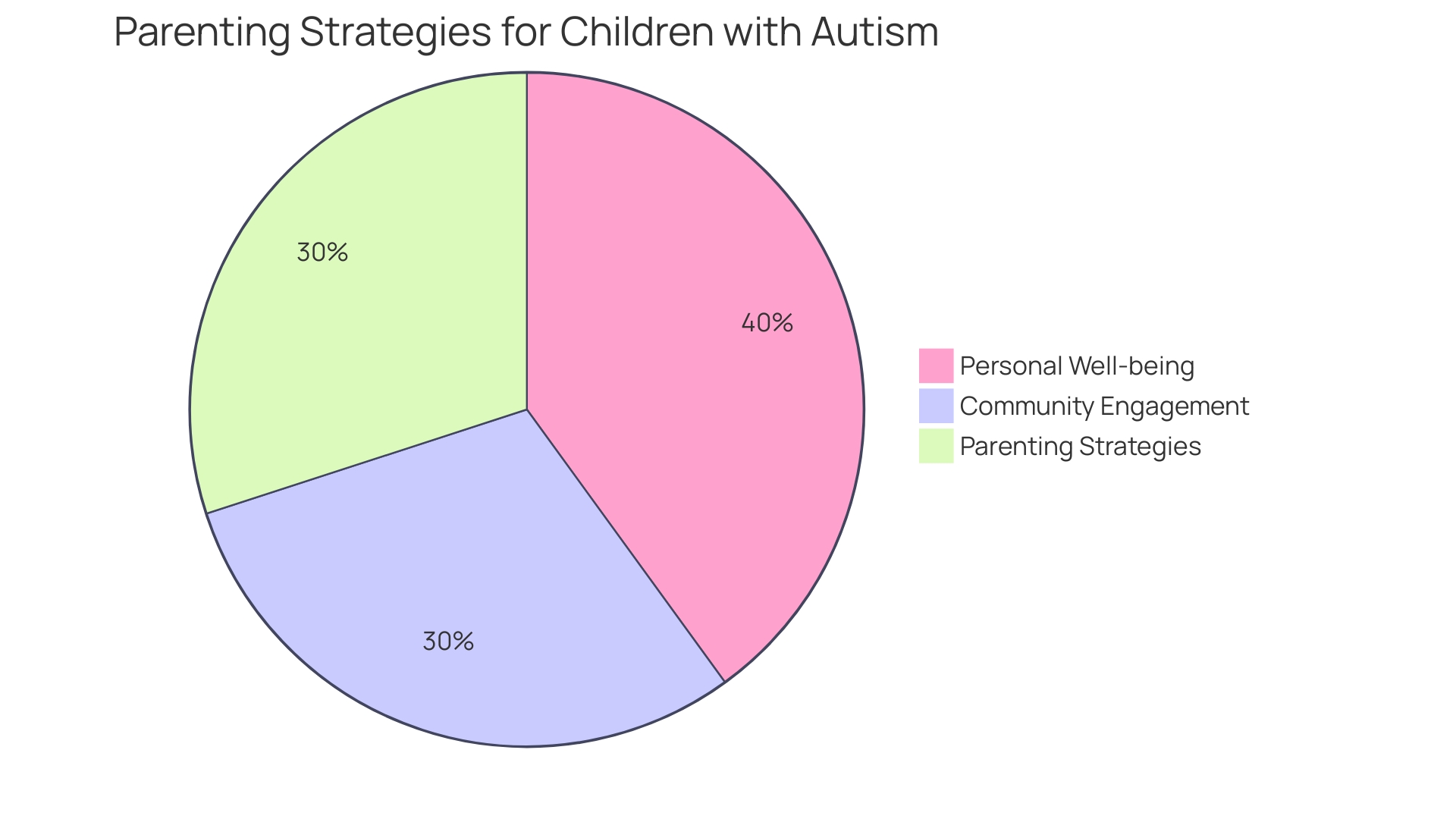
Practicing Self-Care
For parents of offspring with autism, self-care goes beyond mere relaxation; it's a fundamental aspect of ensuring equitable participation in life's key domains for their children. As Dr. David (Dan) R. Offord, a renowned psychiatrist specializing in children, emphasized, a fair 'race' in life for young individuals, especially those with disabilities, means their caregivers must be well-supported. This includes managing stress effectively and tapping into personal wellness, which is crucial for mental health and family well-being. Participating in self-care activities is not a luxury; it is a deliberate approach to improve the capacity to provide the essential support for the development of children and to champion for their involvement in educational and community environments. As the wellness industry burgeons, with projections to reach over $5.3 trillion in 2023, parents are reminded to connect with their inner wisdom rather than seeking external quick fixes. The insights from Brenda Christensen, a CEO and mother, who navigates the challenges of raising a son with a developmental disorder, reflect this sentiment. She emphasizes the importance of staying informed about new medical treatments and approaches, advocating for a balance between research and practical self-care. Ultimately, embracing self-care is to ensure that one's own resources are replenished to continue making the 'race' fair and supportive for individuals with autism.
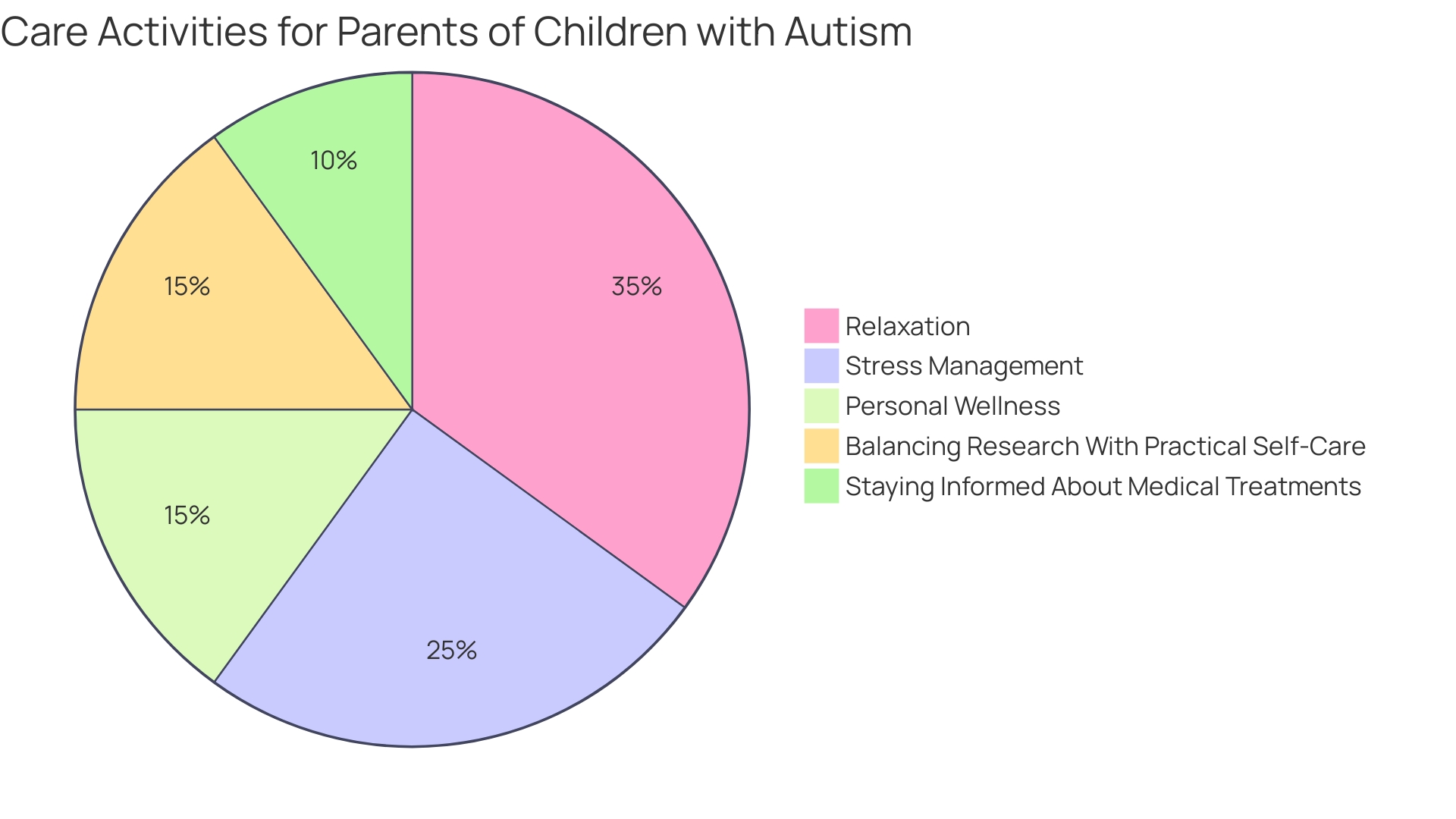
Advocating for Your Child
Establishing an all-encompassing, nurturing atmosphere for youngsters with distinctive requirements is a collective endeavor that incorporates educators, therapists, and healthcare professionals. Together, these dedicated individuals work to develop customized educational plans that cater to each individual's specific requirements, thus fostering their development and well-being. Such partnerships are crucial to ensuring that every individual, including those with disabilities, can engage fully in learning and play, feeling valued and included in their community. For instance, the endeavors of Lumos in Moldova illustrate how inclusive education units can effectively integrate individuals with special education needs into mainstream education while providing specialized support. These initiatives challenge outdated notions and prove that institutionalization is not the sole option for children with disabilities.
Ongoing research and awareness are essential in the field of disability services. Clinicians rely on the latest study outcomes, such as randomized controlled trials, to decide on effective interventions for their patients. With increasing autism referrals and long waits for assessments, it's evident that the system is under considerable pressure, highlighting the significance of staying informed and advocating for enhanced services and assistance. As research methodologies develop, it is imperative that public understanding and legal frameworks also progress to facilitate the inclusion of individuals with disabilities from the earliest ages. Through the sharing of resources and the promotion of inclusive principles, we can guarantee that all individuals, irrespective of their age, have the opportunity to access personalized, top-notch programs that equip them for a lifetime of learning, work, and active participation within their communities. This aligns with UNICEF's vision and the inclusive philosophy of the Individuals with Disabilities Education Act (IDEA), which are committed to the advancement of the rights and well-being of all children, free from discrimination and exclusion.
Conclusion
In conclusion, supporting children with autism requires a multifaceted approach that includes early intervention, effective treatment options, creating a supportive environment, positive reinforcement techniques, managing challenging behaviors, coping with parental stress, practicing self-care, and advocating for your child. By implementing these strategies, parents can empower themselves to navigate the challenges of raising a child with autism and ensure their well-being and growth.
Effective treatment options like ABA, speech therapy, occupational therapy, and social skills training address various aspects of autism and cater to each child's unique needs. Creating a supportive environment involves visual schedules, sensory-friendly spaces, and tailored experiences to enhance participation and engagement.
Building structure and routine through visual schedules empowers children to navigate their daily activities with ease, while positive reinforcement techniques foster desirable behaviors. Managing challenging behaviors requires individualized strategies and community-supported programs.
Coping with parental stress is crucial for maintaining a peaceful family life. Engaging in self-care practices and seeking support from other parents can alleviate stress and provide valuable insights.
Advocating for your child involves collaborating with educators, therapists, and healthcare professionals to develop tailored educational plans. Continued research and awareness are essential for improving services and support for children with autism.
By embracing these strategies and resources, parents can play a vital role in fostering the growth and well-being of their children with autism. It is through their dedication and advocacy that we can create a supportive and inclusive environment that empowers children with autism to thrive.




